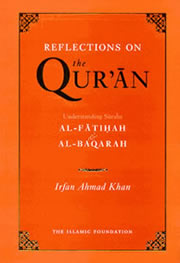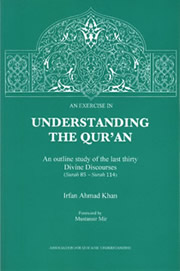According to the Qur’an, many prophets and messengers of God were sent throughout human history, before the revelation of the Qur’an to the Prophet Muhammad, be peace upon him. They all conveyed to their people essentially the same message: According to the Qur’an, many prophets and messengers of God were sent throughout human history, before the revelation of the Qur’an to the Prophet Muhammad, be peace upon him. They all conveyed to their people essentially the same message:
God alone is the Creator, Sustainer and Sovereign of all beings – everyone else is God’s servant. God alone is worthy of worship. Each person will one day return to God to account for one’s performance in the present phase of life.
The prophets helped their followers in building a relationship with their True Deity. They taught their people how to remember God’s name and how to glorify God. They taught how to live, morally and spiritually, a clean, pure life, doing our duty to God and God’s creatures. Through straightening the man-God relationship, they straightened human life as a whole. Mainly, prophets and messengers came at a time when the human society was full of mutual exploitation, corruption, injustice and violence. Human society was divided into conflicting groups. Those who had more wealth and power – instead of helping their fellow human beings – were trying to dominate over weaker sections of society. The prophets of God advocated that there should be no lordship of man over man. None other than God has the status of a deity or a lord. All human beings are equally servants of One God. Thus the prophets of God invited their people to tawhid or servitude to One God, The Lord of All Humankind. This movement turned the divided humanity into One Family of God’s Servants who had mutual respect and mutual concern. Those who were well off shared their resources with those who were in more severe need. The Divine Guidance revealed to the prophets of God was based upon social and economic justice and emphasized a sustainable society.
Unjust and cunning leaders exploited people’s sentiments and the masses blindly followed them. However the true prophets of God helped their people in their spiritual and moral development and guided them to the path of wisdom (hikmah). To the believers, the Divine Book was a constant source of enlightenment in all their affairs.
The Tawhidic mission aims at giving human beings their true freedom and dignity. It liberates their minds and spirits from all slavery – including their blind following of so-called religious leaders. The prophets emphasized the use of `aql or reason. They taught our intellectual faculties are Divine blessings and as God’s thankful servants we must use them properly.
What is most important, Tawhidic message involves accountability to God. Every person is answerable to God for what he/she does. Whatever resources have been given to us, we are responsible for their proper care and we should use them for the benefit of our fellow human beings, who are all God’s servants. We are required to live a pious and virtuous life, with peace and justice, in accordance with the Divine Guidance revealed to the prophets of God. On the Day of Judgment everyone will stand before the tribunal of God to receive God’s forgiveness and reward or punishment.
Just as each individual person has an (ajal), i.e. has been given a limited span of time to live, the whole humanity itself has a limited period to show its performance. When this term (ajal) is over, this world will be annihilated. Later, an altogether different world will come into existence – starting with the resurrection of the dead and the Judgment Day. The new world will open, in the Vicinity of God, unlimited possibilities for future progress and prosperity for the virtuous part of the human world. Nothing is emphasized in the Qur’an like the Forgiveness and Mercy of God. Of course, the criminals who, in spite of God’s repeated warnings, do not repent and do not seek God’s forgiveness – the incorrigible part of humanity – will meet what they were promised, i.e. eternal doom. However, God keeps assuring the sinful servants not to be disappointed in the Mercy of their Lord: If they come back in time and repent, all their sins will be forgiven.
Just as God is testing each individual through giving one some of God’s blessings or depriving one of some of God’s blessings, in the same way various groups of human beings are being tested. The Qur’an mentions the People of Noah, the People of Thamud, and the People of Pharaoh, etc., who gained supremacy over earth due to their progress in the field of science and technology, but transgressed against God and filled the earth with corruption and zulm (violence and injustice). When they did not repent, in spite of Divine Warnings which came through prophets of God, ultimately Divine Punishment came and eliminated them from the surface of the earth. It is interesting to see that just as there is a term (ajal) for each individual and a term (ajal) for humankind as a whole, the Qur’an also mentions a third ajal in the context of rise and fall of various civilizations. God tests various human groups by giving them (e.g.) some kind of supremacy in the human world for a limited period of time.
In the above perspective, the following two cases have special significance:
a) The Case of the Children of Israel: God sent many prophets and messengers to take care of the spiritual and moral development of the Children of Israel so that as a community of believers they stand in the human world with the tawhidic mission and help the establishment of economic and social justice on earth. The Qur’an discusses their story at length, starting with the story of Joseph, to whom a whole Surah of the Qur’an is devoted. The Qur’an discusses the story of Moses and Jesus in more details. It also discusses the stories of David and Solomon as great prophets and kings (Caliphs of God) who established justice and peace on earth. The Qur’an briefly mentions many other prophets of the Children of Israel. The Qur’an underlines that when the Children of Israel did not fulfill their (Tawhidic) covenant, they lost their glory which the Lord of Humankind had blessed them with. The Prophet repeatedly emphasized that the Muslim Community must learn a lesson from the history the Children of Israel as narrated in the Qur’an.
(b) The case of Ummah Muslimah (or the Global Muslim Community) :
According to the Qur’an, no more prophets or messengers will be coming after Muhammad (peace be upon him). Now, it is the responsibility of the followers of the Prophet that they convey the Tawhidic message to the rest of the world and present their own practical example. If this believing community will fulfill their covenant with God, God will help them and give them an honorable position in the human world and they will be rewarded in the Hereafter. Muslim people should learn from the story of the Children of Israel which is elucidated in the Qur’an. If, on the other hand, they will fail to convey the Tawhidic message to the rest of the world – through their practical example and through their words – as earlier the Children of Israel did, who thereby faced great humiliation in the human world, their own fate will not be different.


